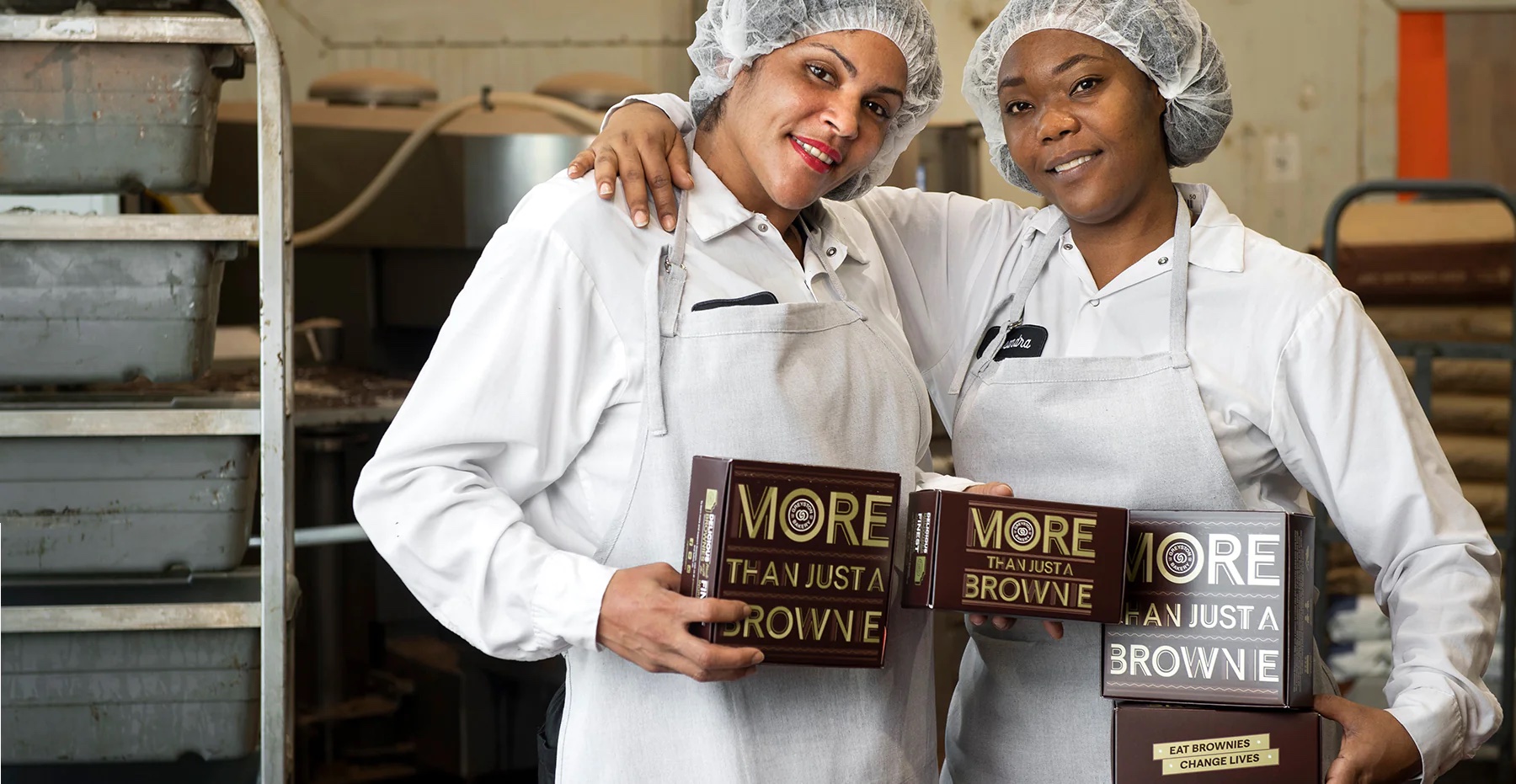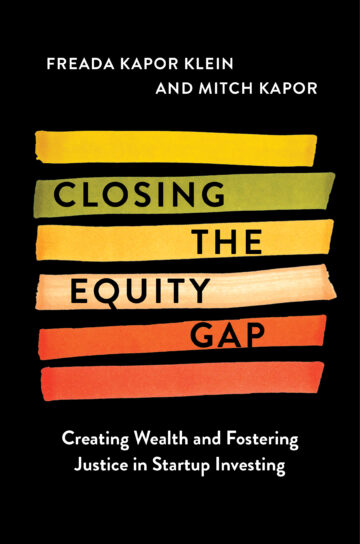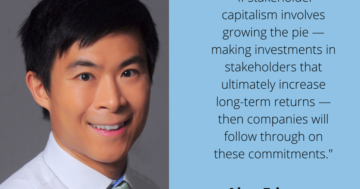When the Second Chance Business Coalition launched in April 2021 — co-chaired by financial services firm JPMorgan Chase and tech company Eaton — it represented 29 large businesses seeking to help individuals with criminal records build careers upon their return to society
Their motivation was both practical and altruistic — as expressed in the coalition’s launch press release. There are millions of unfilled positions across the United States — 8.8 million jobs as of the end of July, the Bureau of Labor Statistics reports. By overlooking or, in some cases, intentionally screening out the 80 million Americans with criminal records, businesses are ignoring a big pool of potential candidates, the coalition said. These individuals deserved a second chance.
“Far too many Americans are limited in their prospects for employment and upward mobility because they have a criminal record, even though they may be qualified for a job,” said Eaton Chairman and CEO Craig Arnold in the coalition’s launch statement. “As business leaders, it is incumbent upon us to remove barriers to employment and advancement by allowing individuals with criminal records to fairly compete for job opportunities.”
In his comment, JPMorgan Chase CEO Jamie Dimon said: “Providing a second chance will give people dignity and allow them to provide for their families, and it helps companies like ours expand the number of people we hire to ensure we get the best talent.”
As of March, membership had grown to 46 multinational businesses representing a wide range of industries — including AT&T, CVS Health, PepsiCo, Procter & Gamble and Walmart. More than 62 percent of these companies have established hiring programs or partnerships to make it more straightforward for individuals with criminal records to apply and navigate their way through their hiring processes, the coalition said.
“The overall goal is to reduce barriers without introducing additional risk,” said Nan Gibson, executive director for second chance, economic security net, and careers and skills with the JPMorgan Chase PolicyCenter. “We have very specific rules, but we recognize the power of businesses coming together to share best practices and also the power of setting demand signals.”

![]()
JPMorgan’s intentional approach to recruiting
About 10 percent of JPMorgan’s new hires annually for the past three years have previous records, Gibson said. (The average among other coalition members is 5 percent.) Those hires are being made at all employment levels.
While JPMorgan Chase hasn’t established specific goals, Gibson said the financial services company made several changes to its recruiting processes, and it is advocating changes to government policy to reduce barriers for those with convictions in their backgrounds. Its recruiting changes include:
- “Banning the box” that asks about criminal records on initial applications and moving to individualized background assessments if a candidate receives a conditional offer of employment.
- Creating partnerships with community organizations and legal-aid groups to raise awareness of its hiring practices in cities including Chicago, Detroit, Phoenix, Columbus, Ohio; and Wilmington, Delaware. In addition, the company is supporting expungement clinics in some of these cities, along with Nashville, New York and Seattle.
- Advocating for “clean slate” legislation at the state and federal level that would automatically seal records for arrests that don’t result in convictions or that would exclude certain offenses. Also included in these bills are policies that would seal records related to nonviolent convictions after an individual serves their sentence and remains crime-free for a certain period of time. So far, laws have been passed in Connecticut, Delaware, Michigan, New Jersey and Virginia. JPMorgan also supported recent updates to the Fair Hiring in Banking Act, which opens up more jobs in financial services industries to “justice-impacted” individuals. That phrase, along with “justice-involved,” is used by advocates to describe individuals who have had contact with the criminal justice system.
“It’s going to be different from industry to industry and culture to culture,” Gibson said, when asked to share advice about how other companies might approach this issue. “The most important thing is to start the dialogue. What we encourage companies to do is just to be more intentional about it.”

![]()
Frontier Co-op’s holistic career development approach
The Responsible Business Initiative for Justice (RBIJ) is another organization that addresses barriers that keep justice-impacted individuals from finding work — and policy advocacy is also a centerpiece of the nonprofit’s activities. Some companies behind its Workforce & Justice Alliance program include Georgia-Pacific, Kelly Services and Frontier Co-op, a wholesaler of natural and organic foods that employs about 530 people in four facilities in eastern Iowa.
Frontier Co-op CEO Tony Bedard’s interest in hiring individuals reentering society after serving time in prison began as a practical matter in 2017 when the company couldn’t fill jobs fast enough. Its Breaking Down Barriers program also covers refugees and homeless individuals; between 2018 and 2022, the company worked with close to 390 apprentices and eventually hired more than 60 people for permanent jobs. There were no terminations of apprentices related to criminal history or physical violence, the company reports.
“First and foremost, we are getting good employees. Employees who want to be here,” Bedard said.
Frontier Co-op works closely with Willis Dady Homeless Services to identify and screen candidates for apprenticeships and guide them to potential opportunities in its workforce. In addition to career development resources, it provides transportation services and subsidized child care to help individuals get to the workplace.
For any job, you take a risk hiring anyone. Not everyone is going to be a good fit for your company.
There are certain boundaries that Frontier Co-op has set for the hiring process to safeguard the safety of its employees and because there is a child care facility on the site, the program doesn’t allow violent or sexual offenders. There is a probationary period during which employees are trained and evaluated. The backgrounds of these individuals are kept confidential, even from the hiring manager. Frontier Co-op’s goal is to hire 50 percent of its entry-level employees through the program, Bedard said.
One of those individuals is Alisia Weaver, a production floor operator who started as an apprentice and has been with the company for nearly three years. Weaver credited the program with giving her a fresh start and keeping her from becoming a repeat offender. “Coming out of a prison, it’s very important to have a reentry plan,” she said. “When you are trying to readjust and can’t find a job, it’s hard to survive.”
Weaver took the step of sharing her experiences with her co-workers. “There have been a handful of people who have thanked me for coming forward,” she said. “People are accepting. My main boss had no idea, but that doesn’t matter. For any job, you take a risk hiring anyone. Not everyone is going to be a good fit for your company.”
Delta Airlines’ strategy to keep at-risk youth out of the justice system
Another RBIJ program being piloted by companies including Walmart, Ben & Jerry’s, and Delta Airlines embraces a strategy of preventing incarceration by providing career paths for at-risk young people, such as those aging out of the foster care systems or who have juvenile misdemeanors on their records. The program, Unlock Potential, is funded by Walmart.org, and it’s focused on the roughly 4.4 million young individuals age 16 to 24 who aren’t employed or in school, making them more likely to wind up in poverty or in the prison system.
Michelle Coley, with Delta Airlines’ global office of diversity, equity and inclusion, said the airline is working with third-party organizations such as the National Urban League, NAACP and smaller local groups to create coaching and development resources to help these individuals build careers — potentially with Delta. “We are selfishly working with organizations where we can find great talent,” she said.
One priority will be to help individuals navigate interviews, build networks and represent their skills more effectively, Coley said. The initial focus will include Atlanta, Detroit, Los Angeles, Minneapolis, New York and Seattle where the company has large workforce presences. This year was spent building processes and resources, and Delta plans to kick off outreach in 2024. It will focus on reaching individuals who meet at least one of four key requirements: They grew up in foster care; they have a juvenile record; one of their parents was or is incarcerated; or they were a victim of sex-trafficking.
Delta has a particular interest in keeping potential future employees out of the criminal justice system: Both the Transportation Security Administration and the Federal Aviation Administration have strict hiring policies that prevent individuals with certain backgrounds from holding aviation jobs.

![]()
Some tips for getting started
Greyston Bakery in Yonkers, New York, is famous for its “open hiring” approach — all of its brownie bakers are hired with no formal experience. The company maintains a list of potential recruits. Supporting that practice requires resources to invest in new employees — using money that would have otherwise been put into recruiting (an estimated $4,000 per employee). This starts as a six-to-nine month apprenticeship; after two to three years, bakers either move up or move on to other roles, said Joseph Kenner, president and CEO of Greyston, during a recent webcast about second chance hiring.
The company has shared the blueprint for this approach, now emulated by companies such as The Body Shop and Ikea, Kenner said. People do get nervous about how to support open hiring, especially those with public companies, but he advised starting small with certain roles: “Take that first step and pilot it for a while.:
For companies interested in hiring justice-involved individuals, RBIJ in April published a handbook with ideas for building a strategy. It lays out potential obstacles employers might face and outlines three pillars to ground hiring initiatives.
- Educating employers on the challenges justice-involved individuals face: That could affect attendance. This might include mandatory drug testing, mandatory health treatment programs, visits with probation officers and a limit to how many hours an individual might be able to work.
- Finding strong partners to help with recruiting and workforce development: Generally speaking, these organizations will be community-specific because they will have the best sense of the skills required in certain regions and which industries have the most job opportunities, said Ashley Furst, the senior program manager at RBIJ who wrote the guide. “The reality is that most of these individuals don’t have their degree or diploma,” she said. “There is a movement to make sure this population has access to educational opportunities.”
- Developing workforce development resources specific to this demographic: Many professions might have licensing requirements that need to be considered, Furst said, but it’s also important to focus on skills that are transferable across industries — such as the ability to negotiate, resolve conflicts or manage projects.
Furst, who reflected upon her own background as a justice-involved individual during our interview, said companies also need to be sensitive to the language used to frame and discuss these initiatives, and refrain from using dehumanizing terms. “These people are more than the worst mistake they made on the worst day of their life.”
- SEO Powered Content & PR Distribution. Get Amplified Today.
- PlatoData.Network Vertical Generative Ai. Empower Yourself. Access Here.
- PlatoAiStream. Web3 Intelligence. Knowledge Amplified. Access Here.
- PlatoESG. Carbon, CleanTech, Energy, Environment, Solar, Waste Management. Access Here.
- PlatoHealth. Biotech and Clinical Trials Intelligence. Access Here.
- Source: https://www.greenbiz.com/article/why-jpmorgan-delta-and-frontier-co-op-support-second-chance-hiring
- :has
- :is
- :not
- :where
- $UP
- 000
- 1
- 10
- 15%
- 16
- 1800
- 2017
- 2018
- 2021
- 2022
- 2024
- 24
- 29
- 46
- 50
- 60
- 7
- 8
- 80
- a
- ability
- Able
- About
- about IT
- accepting
- access
- across
- activities
- addition
- Additional
- addresses
- administration
- advancement
- advice
- advocacy
- advocates
- advocating
- affect
- After
- age
- Aging
- airline
- Airlines
- All
- Alliance
- allow
- Allowing
- along
- also
- altruistic
- Americans
- among
- an
- and
- Angeles
- Annually
- Another
- any
- anyone
- applications
- Apply
- approach
- April
- ARE
- arrests
- AS
- asked
- assessments
- At
- AT&T
- Atlanta
- attendance
- automatically
- average
- aviation
- awareness
- background
- backgrounds
- Banking
- barriers
- BE
- because
- becoming
- been
- began
- behind
- being
- ben
- BEST
- best practices
- between
- Big
- Bills
- blueprint
- body
- BOSS
- both
- boundaries
- build
- Building
- business
- Business Leaders
- businesses
- but
- by
- CAN
- candidate
- candidates
- care
- Career
- careers
- cases
- Center
- ceo
- certain
- chairman
- challenges
- Chance
- Changes
- chase
- chicago
- child
- Cities
- click
- clinics
- Close
- closely
- coaching
- coalition
- coming
- comment
- community
- Companies
- company
- compete
- conditional
- conflicts
- Connecticut
- considered
- contact
- could
- covers
- Craig
- create
- Criminal
- criminal justice
- Culture
- CVS
- data
- day
- Degree
- Delaware
- Delta
- Demand
- demographic
- describe
- Development
- dialogue
- different
- Dimon
- Director
- discuss
- Diversity
- do
- Doesn’t
- Dont
- down
- drug
- drug testing
- during
- eastern
- Economic
- educational
- effectively
- either
- Embraces
- employed
- Employee
- employees
- employers
- employment
- employs
- encourage
- end
- enough
- ensure
- entry-level
- equity
- especially
- established
- estimated
- Ether (ETH)
- evaluated
- Even
- eventually
- everyone
- executive
- Executive Director
- Expand
- experience
- Experiences
- expressed
- Face
- facilities
- Facility
- fair
- fairly
- families
- famous
- far
- FAST
- fdic
- Federal
- Federal Aviation Administration
- fill
- financial
- financial services
- financial services company
- Find
- finding
- Firm
- First
- fit
- Floor
- Focus
- focused
- foods
- For
- foremost
- formal
- Forward
- Foster
- four
- FRAME
- fresh
- from
- Frontier
- funded
- future
- Gamble
- generally
- get
- getting
- Give
- Giving
- Global
- goal
- Goals
- going
- good
- Government
- Government policy
- great
- grew
- Ground
- Group’s
- grown
- guide
- had
- handful
- Hard
- Have
- he
- Health
- help
- helps
- her
- here
- hire
- hires
- Hiring
- his
- history
- holding
- holistic
- HOURS
- How
- How To
- HTML
- HTTPS
- idea
- ideas
- identify
- if
- ikea
- important
- in
- incarceration
- include
- included
- Including
- inclusion
- Incumbent
- individual
- individuals
- industries
- industry
- initial
- Initiative
- initiatives
- Intentional
- intentionally
- interest
- interested
- Interview
- Interviews
- into
- introducing
- Invest
- Iowa
- issue
- IT
- ITS
- Jamie
- Jamie Dimon
- Jersey
- Job
- Job Opportunities
- Jobs
- jp
- jp morgan
- jpg
- JPMorgan
- jpmorgan chase
- July
- just
- Justice
- Keep
- keeping
- kept
- Key
- kick
- labor
- language
- large
- launch
- launched
- Laws
- Lays
- leaders
- League
- least
- Level
- levels
- Licensing
- licensing requirements
- Life
- like
- likely
- LIMIT
- Limited
- List
- local
- los
- Los Angeles
- made
- Main
- maintains
- make
- Making
- manage
- manager
- mandatory
- many
- March
- Matter
- May..
- me
- Meet
- Members
- Michigan
- might
- million
- millions
- mistake
- mobility
- money
- Month
- more
- Morgan
- most
- Motivation
- move
- movement
- moving
- multinational
- my
- NAACP
- Nashville
- National
- Natural
- Navigate
- nearly
- Need
- net
- networks
- New
- New Jersey
- New York
- newark
- no
- now
- number
- obstacles
- of
- off
- offer
- Office
- officers
- Ohio
- on
- ONE
- open
- opens
- operator
- opportunities
- or
- organic
- organization
- organizations
- Other
- otherwise
- our
- ours
- out
- outlines
- outreach
- overall
- own
- parents
- particular
- partners
- partnerships
- passed
- past
- People
- pepsico
- per
- percent
- period
- permanent
- phoenix
- physical
- pillars
- pilot
- piloted
- plan
- plans
- plato
- Plato Data Intelligence
- PlatoData
- policies
- policy
- pool
- population
- positions
- potential
- potentially
- Poverty
- power
- Practical
- practice
- practices
- presentation
- president
- press
- prevent
- preventing
- previous
- priority
- prison
- PRNewswire
- process
- processes
- Production
- Program
- Programs
- projects
- prospects
- provide
- provides
- providing
- public
- public companies
- published
- put
- qualified
- raise
- range
- reaching
- Reality
- receives
- recent
- recognize
- record
- records
- recruiting
- Recruits
- reduce
- reflected
- refugees
- regions
- related
- remains
- remove
- repeat
- Reports
- represent
- represented
- representing
- required
- Requirements
- requires
- Resources
- result
- return
- Risk
- roles
- roughly
- rules
- Safety
- Said
- School
- Screen
- screening
- Seattle
- Second
- security
- seeking
- senior
- sense
- sensitive
- sentence
- serves
- Services
- services company
- serving
- set
- setting
- several
- Sexual
- Share
- shared
- sharing
- she
- Shop
- signals
- site
- skills
- Slate
- small
- smaller
- So
- so Far
- Society
- some
- speaking
- specific
- spent
- start
- started
- Starting
- starts
- State
- Statement
- States
- statistics
- Step
- straightforward
- Strategy
- strict
- strong
- such
- support
- Supported
- Supporting
- sure
- survive
- system
- Systems
- T
- Take
- Talent
- tech
- Tech Company
- terms
- Testing
- than
- that
- The
- The State
- their
- Them
- There.
- These
- they
- thing
- third-party
- this
- this year
- those
- though?
- three
- Through
- time
- tips
- to
- together
- Tony
- too
- took
- trained
- transferable
- transportation
- Transportation Security Administration
- transportation services
- treatment
- trying
- two
- United
- United States
- Updates
- upon
- upward
- urban
- us
- used
- using
- very
- Victim
- violence
- virginia
- Visits
- Walmart
- want
- was
- Way..
- we
- were
- What
- when
- which
- while
- WHO
- why
- wide
- Wide range
- will
- wind
- with
- without
- Work
- worked
- Workforce
- Workforce Development
- working
- Workplace
- works
- Worst
- would
- wrote
- year
- years
- york
- you
- young
- Your
- youth
- zephyrnet









